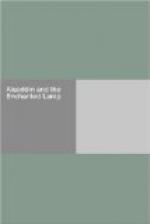[FN#213] Lit. “before or in front of a mountain.” Burton, “we have reached the barren hill-country.”
[FN#214] Ra
[FN#215] Shudd heilek.
[FN#216] Lit. the land of the West (biladu ’l gherb); see ante, p. 57, notes. {see FN#153}
[FN#217] Night DXXIII.
[FN#218] Lit. “without aught " (bilash), i e. without [visible] cause or reason. Burton, “beyond the range of matter.”
[FN#219] Nuhhas szebb (for szebeb min er) reml, lit. “brass poured [forth from] sand,” i.e. cast in a mould of sand. Cf. 1 Kings, vii 16, “two chapiters of molten brass.”
[FN#220] Dir balek, lit. “turn thy thought (i.e. be attentive) [to that which I shall say to thee].”
[FN#221] Night DXXIV.
[FN#222] Lit. “pass not by” (la tuferwwit). Burton, “nor gainsay.”
[FN#223] Yani li-min (vulg. for tani li-men), i.e. on whose behalf do I undertake all these my toils?
[FN#224] Lit. “leave”; but the verb khella (ii. of khela is constantly used in the present text in the sense of “he made.”
[FN#225] There is some mistake here in the text. The word which I translate “great” is akabir (pl. of akber, most great), apparently inserted by mistake for kebir, great. But that akabir is followed by jiddan (exceedingly), I should be inclined to read the phrase [kebiru ’l] akabir, greatest of the great.
[FN#226] Wehdi, lit. “my lone,” a Scotch expression, which might be usefully acclimatized in English prose and verse.
[FN#227] Night DXXV.
[FN#228] Or “pay attention,” dir (vulg. for adir) balek. See ante, p. 78, note. {see FN#220}
[FN#229] Lit. “a place divided into four places” I take the variant aweds, chambers. from Chavis’s copy of the Ms., as quoted by M. Zotenberg.
[FN#230] Liwan, i.e. an estrade or recessed room, raised above the level of the ground and open in front.
[FN#231] Lit. “in it” (fihi); but the meaning is as in the text, i.e. connected with it or leading thereto. This reading is confirmed by the terms in which the stair is afterwards mentioned, q.v. post, p. 83, and note. {see FN#235}
[FN#232] Night DXXVI.
[FN#233] Ubb. Burton, “breast-pocket,” the usual word for which is jeib. Ubb is occasionally used in this sense; but it is evident from what follows (see post, p. 85. {see FN#243} “Alaeddin proceeded to pluck and put in his pockets (ajyab, pl. of jeib), and his sleeves " (ibab), and note) that ubb is here used in the common sense of “sleeve.”
[FN#234] i.e. “that which is in the lamp.”
[FN#235] Burton transposes, “where he entered the saloon and mounted the ladder;” but the context shows that the stair was a flight of steps leading up to the dais and not a ladder in it. The word fihi in the magician’s instructions might indeed be taken in this latter sense, but may just as well be read “thereto” or “pertaining thereto” as “therein.” See also below, where Alaeddin is made to descend from the dais into the garden.




